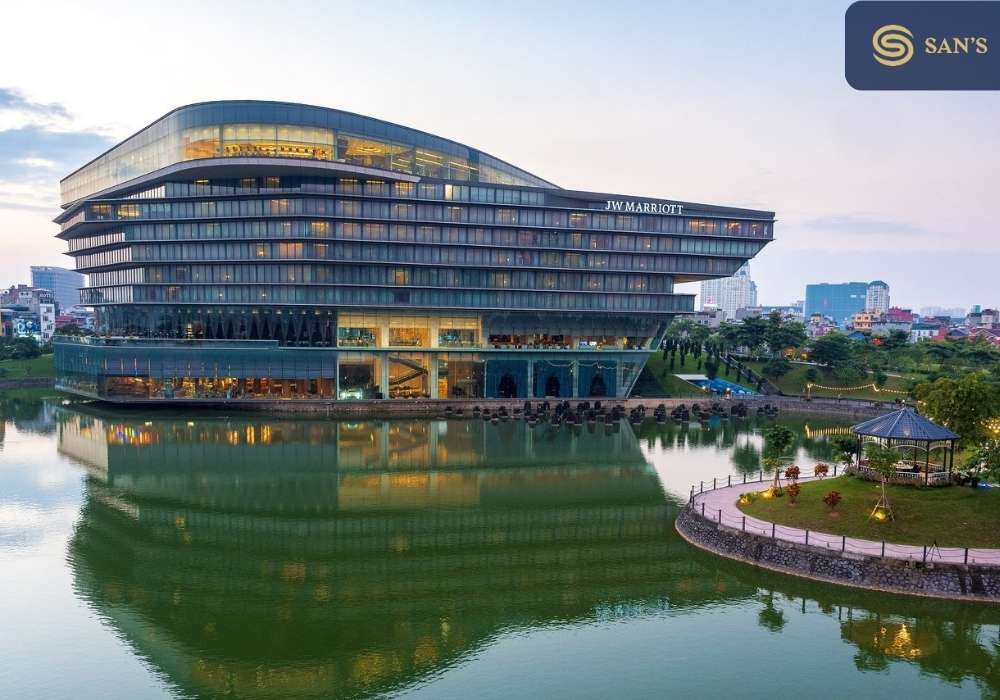Luxury hotels and boutique hotels both offer travelers a unique and high-quality experience on their journey. However, there are notable differences between them that not everyone is fully aware of. This article will help you better understand these two types of hotels and what they bring to travelers.
1/What is Luxury Hotel
A luxury hotel is a high-end establishment that offers superior services, facilities, and accommodations, prioritizing the utmost comfort, pleasure, and satisfaction of its guests. Here are some defining features and attributes of a luxury hotel:
Exceptional Service: One of the hallmarks of luxury hotels is their commitment to providing impeccable and personalized service. This often includes concierge services, 24-hour room service, and staff trained to attend to guests’ needs with a high degree of professionalism.
Elegant and High-Quality Accommodations: Rooms and suites in luxury hotels are often spacious, elegantly designed, and furnished with high-end materials and amenities, such as premium bedding, state-of-the-art entertainment systems, and opulent bathrooms.
Prime Location: Many luxury hotels are situated in prime locations—whether in the heart of a city, overlooking a pristine beach, or nestled in a scenic mountain landscape. They often provide stunning views and easy access to major attractions or natural wonders.
-

Luxury Hotel in Hanoi
Gourmet Dining: These hotels typically house one or more gourmet restaurants, often helmed by renowned chefs, offering exquisite dining experiences and a diverse range of international and local cuisines.
Spa and Wellness Facilities: Luxury hotels often boast world-class spa and wellness centers, providing a range of treatments and therapies, from massages and facials to holistic wellness programs.
-

The Huc Spa – San Grand Hotel (Luxury hotels in Hanoi)
Recreational Amenities: Depending on their location, luxury hotels might offer golf courses, private beaches, infinity pools, fitness centers, and other recreational facilities.
Attention to Detail: Whether it’s personalized stationery, custom toiletries, or a particular style of decor, the attention to the smallest details is a defining feature of many luxury hotels.
Security and Privacy: Many luxury hotels offer enhanced security measures and prioritize the privacy of their guests, making them a preferred choice for celebrities, dignitaries, and VIPs.
2/What is Boutique Hotel
A boutique hotel is a small, distinctive hotel that prioritizes style, individuality, intimacy, and personalized service. Unlike larger chain hotels, boutique hotels often have a unique character and are typically situated in trendy or urban locations. Here are some of the defining features and attributes of a boutique hotel:
Size: Boutique hotels are usually smaller in scale, typically ranging from just a few rooms to fewer than 100. Their intimate size allows for more personalized attention to each guest.
-

Boutique Hotel in Hanoi Vietnam
Distinctive Style and Character: These hotels are often characterized by their unique design and artistic flair. The decor is usually distinctive, differing from room to room, with a strong emphasis on aesthetics and individuality.
Personalized Service: A hallmark of boutique hotels is their focus on providing a tailored and personalized experience for their guests. The staff might be more attuned to individual guest preferences, and services are often more bespoke.
Local Flavor: Boutique hotels often emphasize and celebrate local culture, art, and cuisine. They may showcase local artwork, serve regional dishes, or offer locally inspired amenities, giving guests a more authentic experience of the destination.
Unique Setting: Many boutique hotels are located in historic, renovated buildings, such as former mansions, factories, or other notable structures. Their settings can be urban, rural, or even exotic, but they typically blend seamlessly with the local environment and culture.
-

Boutique Hotel in Hanoi Vietnam
Exclusive and Upscale: Even though boutique hotels are smaller, they often provide upscale amenities and services similar to those found in luxury hotels. This can include gourmet dining, in-room technology, and wellness facilities.
Independence: A significant aspect of boutique hotels is that they’re often independently owned or part of smaller hotel chains, giving them more flexibility and autonomy in their design, services, and overall character.
3/How Different Between Luxury Hotels and Boutique Hotels in Vietnam
Both luxury and boutique hotels offer upscale accommodations, but they differ in their ethos, size, and often in their approach to service. Here’s a breakdown:
- Size and Scale:
- Boutique Hotels: These are typically smaller, often having fewer than 100 rooms. The smaller size often allows for more personalized service and attention to each guest.
- Luxury Hotels: They can be large and might be part of an international chain, such as the Ritz-Carlton or Four Seasons. They’re expansive, often boasting a wide array of amenities and hundreds of rooms.
- Design and Atmosphere:
- Boutique Hotels: Often characterized by a unique, eclectic, or thematic design. They might be themed around a particular era, concept, or even a storyline. The interior decor tends to be distinct and might change from room to room.
- Luxury Hotels: Typically follow a more consistent and grand design throughout. Elegance, opulence, and uniformity are often the focal points. They’ll have high-end finishes and furnishings but may not have the quirky or thematic touch of a boutique hotel.
- Service:
- Boutique Hotels: Due to their smaller size, boutique hotels can offer a more personalized experience. Guests might find the staff remembering their names or personal preferences.
- Luxury Hotels: They offer impeccable service standards, but given the size of some luxury hotels, the service might not be as personalized as in a boutique setting. However, the breadth of services, like concierge desks, spas, in-room dining, and more, will be extensive.
- Location:
- Boutique Hotels: Often found in trendy neighborhoods, historic buildings, or off-beat locations, adding to their unique character.
- Luxury Hotels: Generally situated in prime, sought-after locations, be it city centers, beachfronts, or other tourist-centric areas.
- Amenities:
- Boutique Hotels: The focus is on quality over quantity. Amenities are tailored and selective, ensuring they align with the hotel’s theme or ethos.
- Luxury Hotels: They come packed with a wide range of amenities, from expansive spas, multiple dining options, business centers, to sometimes even helipads.
- Branding:
- Boutique Hotels: Tend to be independent or part of a smaller chain. They prioritize individuality.
- Luxury Hotels: Often part of larger, internationally recognized hotel chains. Their branding is consistent across different locations worldwide.
- Target Audience:
- Boutique Hotels: Aimed at travelers seeking a unique, intimate, and localized experience.
- Luxury Hotels: Targeted at those looking for a lavish experience with a brand they recognize and trust.
Both boutique and luxury hotels cater to travelers seeking upscale accommodations, but they differ fundamentally in their offerings and appeal. Boutique hotels, with their unique designs and intimate settings, offer a personalized and immersive experience, often reflecting the local flavor and culture. Luxury hotels, meanwhile, prioritize grandeur, a vast array of amenities, and consistent top-tier services that align with globally recognized standards. The choice between the two hinges on whether a traveler values individuality and character or opulence and predictability.
>>> See more: Hotel in Hanoi Old Quarter





